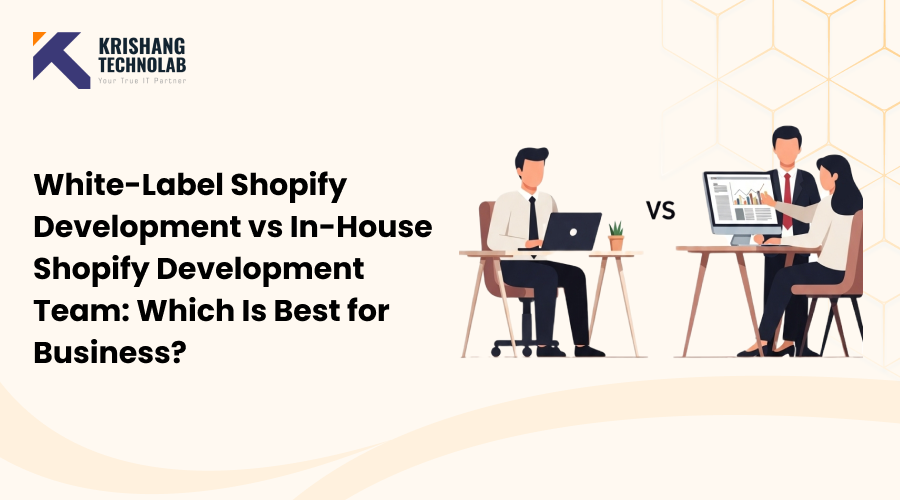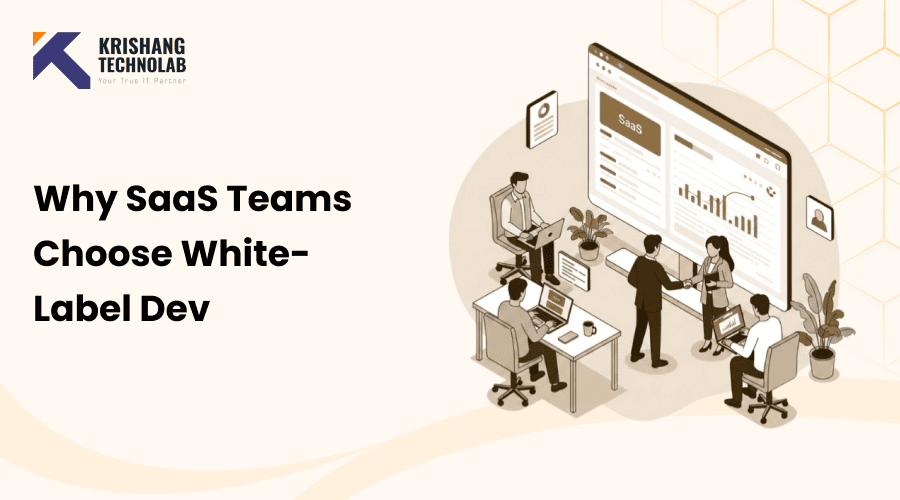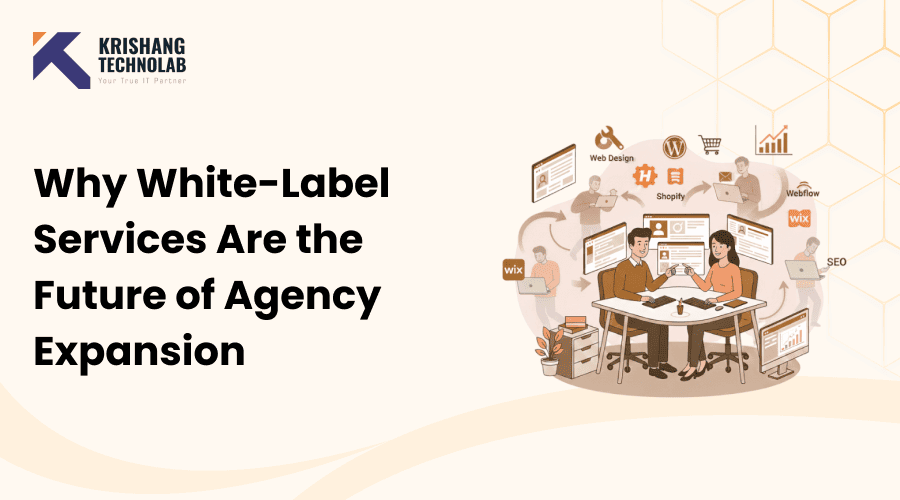Quick Overview: This blog compares White-Label Shopify Development vs In-House Teams in terms of prices, scalability, control, expertise, speed, risks, and long-term value. It helps businesses figure out which model is ideal for their growth, efficiency, and overall eCommerce goals.
Shopify is becoming one of the best platforms for developing online stores in today’s e-commerce world. In this post We’ll discuss about White-Label vs In-house Shopify Development. When a business grows, it typically has to make a big choice: Should you hire a white-label partner to do your Shopify development for you, or should you spend money on establishing an in-house Shopify development team?
This decision can have a big effect on your budget, project timeframes, quality of work, and long-term growth. In this piece, we’ll go into detail about both choices, pointing out their pros and cons as well as how they may be used in the real world. This will help you choose the best one for your business.
What Is White-Label Shopify Development?
White-label When you hire a third-party agency or freelance team to work on your Shopify projects, you are outsourcing Shopify development. Your clients think of your agency as the developer, yet the technical work is donFte by someone else.
For instance, a digital marketing agency might help clients set up a Shopify store, change the theme, or make an app, but they would rely on a white-label Shopify development partner to do the coding, integrations, and other technical work.
Advantages of White-Label Shopify Development
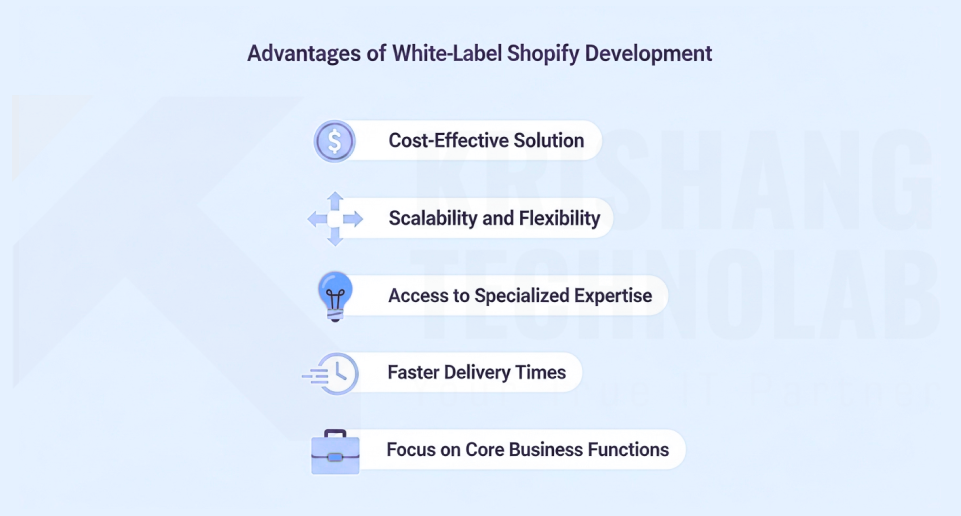
1. Cost-Effective Solution
If you hire a white-label Shopify development team, you won’t have to pay full-time salaries, benefits, or office costs. You just pay for the projects you work on, therefore it’s a good choice for small businesses and new businesses.
2. Scalability and Flexibility
You may quickly add or remove development resources based on what your clients need. This is great for agencies that are working on more than one Shopify project at the same time.
3. Access to Specialized Expertise
Many white-label Shopify developers are very good in Shopify Plus, developing custom apps, customizing shopify themes, and integrating with other apps. This means that your clients may get expert help without having to train their own staff.
4. Faster Delivery Times
Established firms already have templates, workflows, and reusable parts that help them finish projects faster and get to market faster.
5. Focus on Core Business Functions
Your team can focus on sales, marketing, and client management while the development partner takes care of the technical work.
Read More About: Shopify vs Shopify Plus: Which One is Best for Your Business?
Challenges of White-Label Shopify Development
- Limited Control: You are dependent on a third party to ensure that technical standards, deadlines, and quality are met.
- Communication Barriers: Approvals may be delayed due to discrepancies in communication styles or time zones.
- Dependency Risks: Your organization may become excessively dependent on a single white-label partner.
- Lower Profit Margins: Revenue sharing with the development partner may result in a decrease in margins.
What Is an In-House Shopify Development Team?
An in-house Shopify development team is made up of workers who work directly for your business. They work full-time, follow your company’s rules, and work closely with other teams.
For example, a well-known e-commerce company might hire Shopify experts, front-end developers, and back-end developers to handle client projects in-house. This plan gives you more power, lets you make changes, and fits with the goals of the company.
Advantages of an In-House Shopify Team
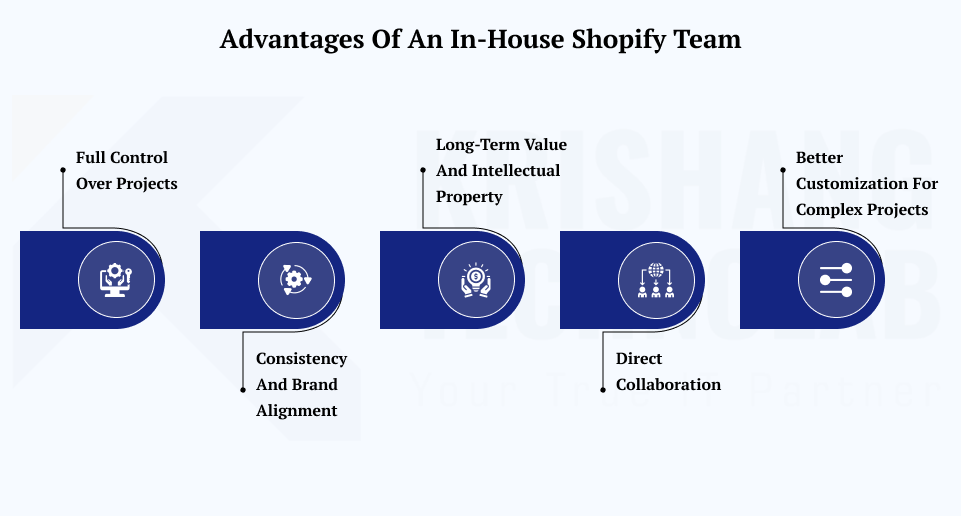
1. Full Control Over Projects
You choose the schedules, procedures, coding standards, and priorities for projects to make sure they suit your exact needs.
2. Consistency and Brand Alignment
An internal staff knows how your business works, what your clients want, and how your brand sounds, so all of your projects will be of the same high quality.
3. Long-Term Value and Intellectual Property
The knowledge, apps, and code your team makes stay in-house, which gives your organization long-term IP value.
4. Direct Collaboration
Developers can work closely with your design, marketing, and sales teams to make sure that the shop works in a way that supports the aims of the whole firm.
5. Better Customization for Complex Projects
An in-house team can build very specific solutions for bigger stores that need specialized apps, advanced integrations, or unique workflows.
Also Read About: How Much Does Shopify Website Development Cost?
Challenges of an In-House Shopify Team
- High Costs: Office space, salaries, perks, and software licenses all add to costs.
- Long Hiring Cycles: It can take months to find good Shopify developers.
- Scaling Challenges: It’s harder and takes more resources to grow your workforce to fulfill demand.
- Idle Resources: When the amount of work on a project goes down, you still have to pay full compensation, which hurts profits.
White-Label vs In-House Shopify Development: A Detailed Comparison
We now know what white-label agencies and in-house teams are. Let’s look at the most critical things that set them apart: cost, scalability, control, expertise, speed, long-term value, and risk.
1. Cost
white-label agencies are usually less costly. You just pay for the work you outsource, which means you don’t have to pay for things like full-time salaries, benefits, and training. This makes them perfect for new businesses or agencies with tight budgets.
On the other hand, teams that work in-house need a lot of money. Costs go grow because of hiring, pay, perks for employees, and infrastructure. But for organizations that have a lot of work, an in-house staff may be cheaper over time as the cost per project goes down.
White-label agencies are cheaper for flexible or project-based work, but in-house teams may be superior for long-term cost effectiveness if projects come in regularly.
Read More About: How much does it cost to hire a Shopify expert?
2. Scalability
White-label agencies can grow very quickly. If you unexpectedly have a lot of Shopify projects, they can immediately add more developers to your team. You can cut back without hurting your finances if demand dips.
Teams that work in-house grow more slowly. To grow, you need to hire more people, train them, and onboard them, which costs time and money. It’s also hard to downsize because you can’t just fire permanent personnel without consequences.
White-label agencies are appropriate for organizations whose workloads change or are seasonal, while in-house teams are best for businesses whose development is steady and predictable.
3. Control
White-label agencies operate on an external level, giving you less control over procedures, coding standards, and schedules. Communication gaps or delays may limit your ability to influence how tasks are handled.
You have complete control over in-house teams. You have the ability to establish priorities, enforce standards, and track progress directly. This leads to better alignment with your brand and faster adjustments as necessary.
White-label agencies provide convenience but less control. In-house teams provide maximum oversight and alignment with corporate goals.
4. Expertise
White-label firms generally hire experts in a variety of fields, such as Shopify Plus, bespoke apps, theme customization, and third-party integrations. It’s hard to have this level of knowledge inside your own company unless you have a very big team.
In-house teams build expertise based on the people they hire. They may excel in your field but lack wide exposure to diverse initiatives, which may limit innovation unless you invest considerably in training.
White-label agencies provide fast access to varied expertise, whereas in-house teams develop deeper understanding relevant to your brand and clients.
5. Speed
White-label firms typically complete projects faster because they already have established methods, reusable templates, and larger teams that are ready to go.
In-house teams might be reluctant to move, especially if they are small. They do, however, benefit from greater collaboration with your other divisions, which can help to prevent miscommunication and rework.
White-label agencies are ideal for short turnarounds, whereas in-house teams may give slower but more specialized collaboration.
6. Long-Term Value
White-label agencies are only good for a short time. They do good job, but the agency usually keeps the expertise and intellectual property (IP).
Teams that work in-house add long-term value. Your company keeps all of its code, bespoke solutions, and knowledge, which makes assets that can be used again and again and make your business stronger over time.
White-label agencies are great for getting results right away, but in-house teams are better for long-term IP and strategic value.
7. Risk
There are hazards that come with using white-label agencies. Your projects could suffer if your partner becomes unavailable, hires new people, or lowers the quality of their work.
In-house teams are at danger of problems with their employees. Some key developers would quit, which would cause delays and gaps in expertise. It can be expensive and disruptive to have a lot of employees leave.
White-label agencies are at risk of relying on outside help, while in-house teams are at risk of HR problems within the company. Both methods come with dangers, so you’ll need to make sure you have the right contracts, backup plans, or retention measures in place to protect yourself.
| Factor | White-Label Shopify Development | In-House Shopify Team |
| Cost | Pay per project, lower overhead | Fixed salaries, high overhead |
| Scalability | Easy to scale up/down quickly | Slow to scale, requires hiring |
| Control | Limited, dependent on agency | Full control over processes |
| Expertise | Access to specialized skills | Must hire/train internally |
| Speed | Fast delivery with experienced teams | Depends on team size & experience |
| Long-Term Value | Limited IP ownership | Retains knowledge & IP in-house |
| Risk | Dependent on third-party | Employment risks, attrition |
When to Choose White-Label Shopify Development
Businesses who want to do white-label Web development should
- Are new businesses or tiny agencies with few resources.
- Need to be able to change quickly and grow quickly to meet different client needs.
- Need to be able to get help from Shopify specialists without making a long-term commitment.
- Have initiatives that are the same and don’t need answers that are really specific.
For example, a digital marketing agency that gets a lot of requests for Shopify stores can hire a white-label partner to do the development work. This frees up the agency’s team to focus on getting new clients and building the brand.
When to Build an In-House Shopify Team
In-house development is best for businesses that:
- Ensure that high-volume client work is managed consistently.
- Need to maintain strict control over deadlines and quality.
- I intend to develop proprietary Shopify apps, themes, or integrations.
- Strive for long-term expansion and the preservation of intellectual property.
Example: An internal Shopify team may be advantageous for an established e-commerce agency with consistent client demand, as it guarantees improved collaboration, brand consistency, and long-term value.
Read More About: In-house team vs Remote team vs Dedicated team – which model is the best for a startup?
Key Takeaways
- White-label Shopify development is great for startups or agencies whose tasks change because it is flexible, saves money, and allows for quick growth.
- In-house Shopify teams give businesses that have a lot of repeat clients and complicated projects needs more control, flexibility, and long-term intellectual property.
- A lot of successful agencies use a hybrid approach, which means they use in-house developers for important projects and white-label partners for extra work. This gives you power and freedom at the same time.
Final Thoughts
Deciding between white-label Shopify development agency vs in-house team are not the same for everyone. Your choice should be in line with your business goals, budget, client needs, and plan for long-term growth.
You can choose the method that will make the most money, time, and customer happiness by carefully looking at your resources, project needs, and scalability needs.
Why Choose Krishang Technolab As Your White Label Shopify Development Partner
At Krishang Technolab, we build Shopify stores that will grab your attention, maintain it, and build a strong relationship with you. Working with our dedicated Shopify developers and using our white-label Shopify development services has several benefits. These will help you improve your services and generate greater revenue for your business.
FAQs: White-Label Shopify Development vs In-House Teams
1. What is white-label Shopify development?
White-label Shopify development is when a third-party agency builds or customizes Shopify stores on behalf of another company, allowing the company to resell the service under its own brand.
2. What are the main advantages of white-label Shopify development?
The biggest advantages are cost savings, scalability, faster project delivery, and access to specialized expertise without needing to hire a full-time team.
3. Why should a business consider an in-house Shopify team?
An in-house team gives businesses more control, better alignment with brand values, and the ability to build long-term intellectual property and custom solutions tailored to their needs.
4. Which is more cost-effective: white-label or in-house Shopify development?
White-label is more cost-effective in the short term since you pay only per project. In-house teams may be more expensive initially but can become cost-efficient over time for businesses with a steady flow of Shopify projects.
5. Can a business use both white-label and in-house Shopify development?
Yes. Many businesses adopt a hybrid approach using an in-house team for core projects and a white-label partner to handle overflow or specialized tasks.
6. How do I decide between white-label vs in-house Shopify development?
The choice depends on factors like budget, project volume, need for control, long-term goals, and whether flexibility or brand alignment is more important to your business.
7. Is white-label Shopify development reliable?
Yes, if you partner with a reputable agency. Look for proven expertise, client testimonials, and clear communication to ensure reliable results.
